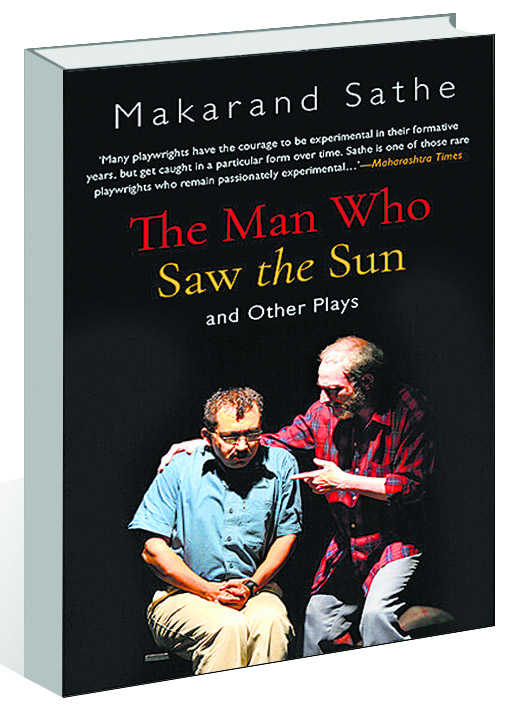
The Man Who Saw the Sun and Other Plays by Makarand Sathe. Speaking Tiger. Pages 185. Rs 350
Nonika Singh
“Socrates lives not by ideas alone but by practice of those ideas.” And ideas are what drive Makarand Sathe’s writing, especially his plays. Reading a play, even for die-hard theatre aficionado, is not an easy exercise. When the playwright Sathe happens to be a renowned novelist and writer of plays, articles and film scripts; decoding his plays while browsing through English translation becomes doubly onerous.
Yet, the book, a compilation of three plays, soon has you in a thrall; not excitement as we know or understand, but as an intellectual rush. Sathe’s understanding of the world around him, his ruthless approach in underlining the foibles of the middle class and finally his inimitable indictment of their ways reflects in the very first play, They Went Ahead.
It begins in a surreal world and soon acquires a chilling dimension. The final denouement of the middle-class intellectual hits you like a bolt in the blue. Indeed, his plays are multi-layered, complex and underline more than one idea. As Shanta Gokhale, who has penned the introduction, as well as co-translated many of the plays, informs that his ideas stem from his wide reading of philosophy, political theory and his socio-political concerns. The overriding concern for the marginalised/ the poor is amply stressed upon as the bestial act of rape of farmer’s wife is analogous of exploitation from which even those possessing a conscience also fail to shirk away from.
His most acclaimed play, The Man Who Saw The Sun, is set in the backdrop of Socrates’ trial. Even in translation, dialogues do not lose their punch, bite or import. Socrates’ utterances, “I realised that the men most in repute were invariably foolish and that the others less esteemed were really wiser and better” uphold Socrates or as Sathe asserts Plato’s philosophy. Yet, when Socrates beseeches fellow Athenians, “You are not ashamed of collecting the greatest amount of money and honour and reputation and caring so little about wisdom and truth and improvement of the soul,” it could well be the playwright speaking.
The play acquires a larger-than-life space when Socrates delivers his monologues. The truth appears not just as a poetic idealistic value but a practice that men must follow. The philosophical thoughts once again underpin the second play, Crossroads, where clearly the traffic jam on the road is a microcosm of society. Herein you see super-rich women, who irrespective of the class they hail from, remain on the fringe. Then there is a man who, having lost his job, is at the receiving end of economic liberalism. It’s here that the writer makes you imagine the entire structure of the play besides making you a participant in his thought process.
An architect by profession, Sathe constructs his plays, and visual plotting is as vital as the obvious verbosity. At times, it may not be easy to keep pace with the torrent of words that gush forth with speed and profundity. But amid the verbal deluge, Sathe’s characters come alive even when words paint the picture. The book is undeniably no page-turner. Yet, it is an immersive enough experience that introduces you to more than the nuances of theatre. It heightens one’s understanding of the society which encompasses us yet we choose to ignore its fault-lines, especially when these stop at us. An intriguing read for theatre lovers, there is much to learn for serious theatre practitioners.
It whets the appetite of average theatre-goers to watch these very plays on stage. Alas, those of us who haven’t seen Sreeram Lagoo infuse life into the part of Socrates would, of course, have to make to do with a lesser actor play the same, now that Lagoo is no longer active. But for this lament, nothing in the book is a cause for consternation. Much to chew on, certainly as the sutradhar in Crossroads says: “You can’t understand the dialogues unless you understand the monologues, can’t understand the spoken one sentence unless you understand the unspoken nine that precede it. Soak on the said and unsaid, there is so much to read between the lines as well as the written word.



























